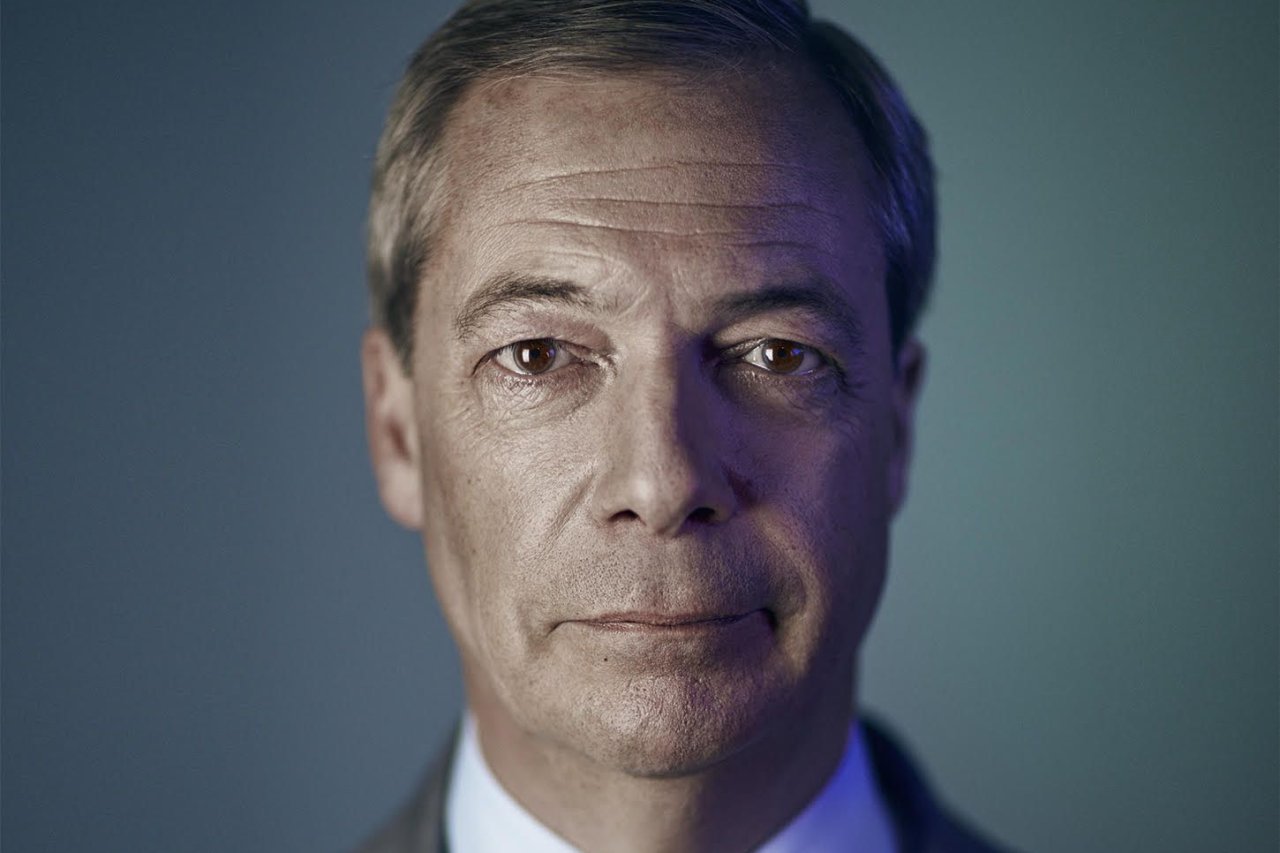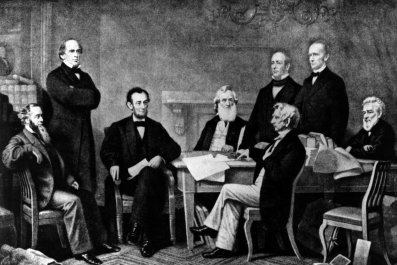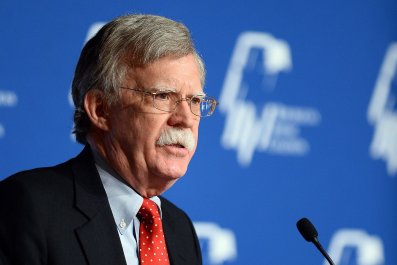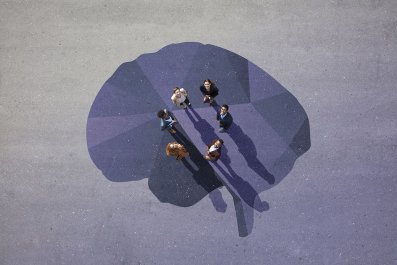Brexit headquarters in London is a poky Westminster townhouse a stone's throw from the Houses of Parliament. Its location is fitting because the only person who has an actual office in the building is Nigel Farage, a man who has made throwing stones—at British Parliament, at so-called globalists, at the European Union—his life's work.
Yet Farage, the Brexit activist turned TV and radio personality, is hardly ever there. As a European member of Parliament, he spends at least two days a week in Brussels or Strasbourg—which, he concedes, can be a little awkward nowadays—as well as in the U.S., where he attends conferences, gives speeches and has abuse hurled at him as he walks down New York's Fifth Avenue. To be fair, that abuse happened only once, Farage says, and generally—whether he's in a bar or a taxi—he gets a far warmer welcome in the U.S. than in the U.K., at least since Britain voted to leave the EU in 2016.
A vocal supporter of President Donald Trump and a Fox News pundit, Farage is regularly tasked with explaining Europe to conservative America. But he keeps an eye on Europe, and he likes what he sees. Since Brexit, Farage's anti-EU allies have been emboldened. In Hungary, Viktor Orbán won a resounding victory in April's election. In Italy, the right-wing populist Five Star Movement has become the country's largest party, and Germany's far-right Alliance for Deutschland (AfD) has become the country's second biggest. In 2018, the European project is floundering, and Farage couldn't be more pleased.
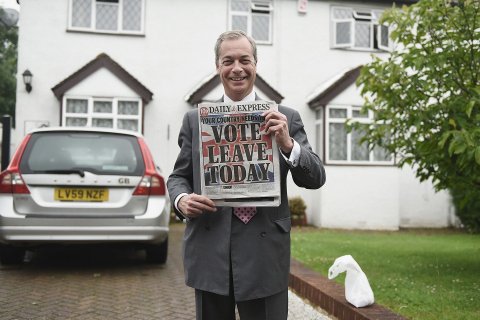
The former commodities trader isn't finished in Britain either, despite the U.K. Independence Party (UKIP) that he founded all but imploding since he stood down as leader (for the second time) soon after Brexit passed. Farage expects the U.K., as planned, to leave the EU on March 29, 2019, but has not ruled out the possibility that forces within the Conservative Party or its Labour rivals will try to sabotage Brexit. If that happens, he says, he's ready to put aside the punditry and get back out on the streets.
Recently, Farage spoke to Newsweek about his political future, Trump's presidency and the war in Syria, among other things.
Are you looking forward to Trump visiting the U.K.?
It is a hell of a long time coming. I mean, if you think about it, we have an American president who likes this country...who supported Brexit and who said there was so much more we can do together in trade, etc. There was an amazing opportunity for the Atlantic to get a bit narrower, and it hasn't. It just hasn't.
There has certainly been a lot of opposition to his visit here.
Prime Minister Theresa May has said some regrettable things about him. As for the British ambassador [to the U.S.], there is no point [in] them even meeting. I mean, Sir Kim Darroch is a great globalist. We really squandered the opportunity. But I am pleased that at last he is coming—better late than never.
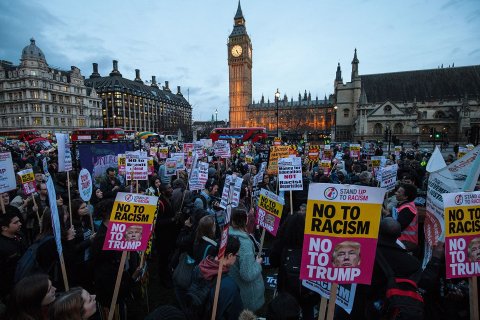
You mentioned the word globalist. What do you mean by that?
I mean those who support nation-states handing up to higher levels of authority the ability to do the normal things that nation-states have always done: make their own laws, have their own courts, control their own borders.
Is French President Emmanuel Macron a globalist.
Oh, absolutely. Macron is hugely pro–the European project. He is calling for many more powers to be centralized in Brussels, powers taken from the member states.
You recently had lunch with him? How did it go?
Very personable.... Speaks with a lot of passion. He's an operator. He's doing some things in France that are quite interesting. He's taking on the trade unions, and he is looking to try and reform taxes. But on the big European stuff, he is barking up the wrong tree. I think they all are. If you look at everything going on—from Italy to Hungary—I believe that the Brexit-Trump phenomenon of 2016—that revolution is still rolling.
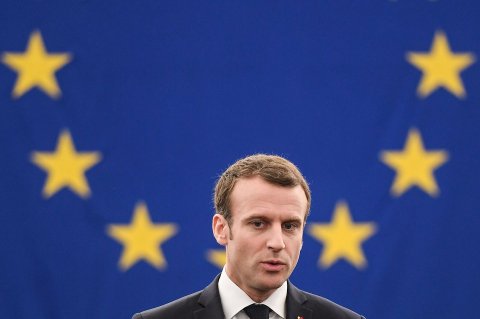
But wasn't German Chancellor Angela Merkel's re-election in March a blow to that revolution?
Merkel is a hugely weakened figure. We now have the AfD—a voice of opposition to the European project—the second biggest party in Europe. Who would have believed that five years ago?
You're not concerned about the fascist elements of some of Europe's new populist right-wing parties?
I am very concerned that the euro has brought neo-Nazism back, absolutely. Golden Dawn only happened because Greece is in the euro. And here is the irony: A project that was set up to stop the extremes of nationalism actually is causing it, because it is taking away from people their ability to influence their own futures.
In America, there has been concern that Trump's election has emboldened neo-Nazi groups.
I just think they have always been there. I suspect that they are smaller now than they were 50 years ago. Should we be worried about them? A bit. Should we be really worried about them? [Shakes head.] There just aren't enough of them.
Do you think Trump could have been elected if Brexit hadn't happened?
I think it was a tremendous help. I also think Brexit had an astonishing effect on America. I was in Cleveland—I went over for the Republican Convention—and I was just stunned that taxi drivers, people in the bars and restaurants, would say: "Hey, you're the Brexit guy. How's that all working out?" People were genuinely interested. We get this impression that people in America don't care what's happening in the rest of the world. Well, certainly with Brexit that was not the case.
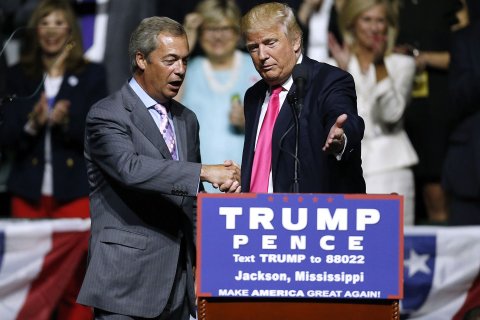
You have said that since the Brexit vote you have encountered hostility in Britain. Is that still the case?
That started back in 2013. If you challenge the establishment—and, by God, I did challenge the establishment—they don't exactly come out with a tray of drinks for you. And so what we have had here is, in soccer terms, going for the man and not the ball. So rather than dealing with an argument I might make, they say, "Oh, Farage says this because he is an extremist." I've been called everything actually, everything. The list is as long as your arm.
You have been called an Islamophobe...
Oh yes, thank God. I would be very upset if that wasn't on the list. And now anti-Semite...because I attacked George Soros.
On anti-Semitism, you also made a comment on your radio show…
Yes, dealing with a virulently anti-Semitic caller who said he didn't think it was the Russians that influenced the U.S. election, it was the Jews—that the Jews got Trump elected. To which I said: Well, there is a Jewish lobby, and it is well organized, and they are very professional, but not for one moment do I think they influenced the election result.
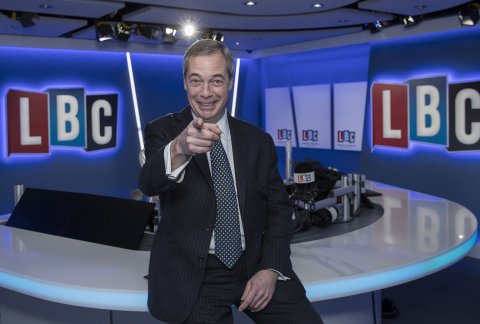
So it was taken out of context?
Wildly. As I say, given that I had [British newspaper proprietor] Richard Desmond and some very prominent Jewish people who have supported me in UKIP with money and resources over the years, that was the only term of abuse that had never been thrown at me. Now, I think I have a royal flush of terms of abuse.
We have finished up with a percentage of the population hating me because they have been told this is what this guy stands for. And I haven't had that in America. I mean, I have had abuse hurled at me walking down Fifth Avenue, but I haven't felt physically intimidated in America in a way that I have, sadly, in this country.
Is it fair to say that the push into the U.S. is because of your lack of popularity at home?
No, I am wildly popular here. There are millions of people out there who love me, that buy me a drink and want photographs, and won't let me be without talking to me and having selfies.
Have you met any sort of protests when speaking at U.S. universities?
I'll tell you what was funny: It wasn't the students protesting; it was the professors holding up their boards: "No to Farage! No to bigotry!" And I thought, Wow, that's where the problem is.
Are you a bigot?
No.
Are you Islamophobic?
No, I'm not. My agenda is...very normal. I was in business, I supported Margaret Thatcher's modernization and reforms of the economy. It was painful for some people, but it had to happen, and it brought us into the modern world. I worked in a very global business, possibly the most global of the lot.
I do believe in the nation-state model. I do believe in a system where the people who make the laws are directly accountable to us. I've always thought that immigration was an issue that needed handling with care, and with sensitivity. I am painted as this crazed radical, and if you think about it, they are quite traditional points of view.
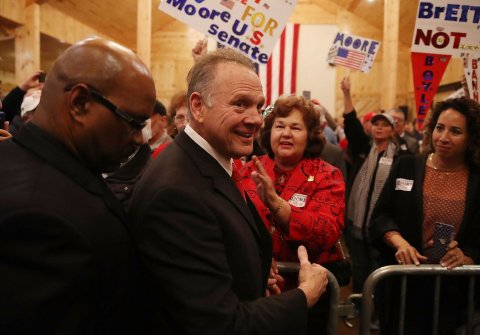
Perhaps it is because of some of the company you have kept, such as Roy Moore and Steve Bannon.
I am a radical in the sense that I want change. Steve is a radical, absolutely, and is unafraid to say what he thinks. I met Roy Moore once. You know, when you do things in life, you do get some things wrong.
Campaigning for Moore in the Alabama Republican race was a mistake?
Looks like it, doesn't it?
When was it that you realized it was a mistake? Was it the sexual assault claims?
A load of people contacted me and said would I go and support, and at the last minute I decided to. I should have thought about the whole thing far more deeply than I did, and it was a mistake.
What about your relationship with Bannon? Was that a mistake?
I've known Steve a long time. And Steve makes mistakes. He says things he shouldn't say. But is Steve a clear thinker about politics, about direction, about where things are going? Is he good at analyzing how things are happening within economies and so on? Yeah. And I think with Steve you get somebody whose working-class background is very much a part of who he is.
Is he a white nationalist?
I have never heard him say anything disobliging against black people. I've never heard anything. Is he a nationalist? Yeah, of course. He would define himself as a nationalist. He happens to be white. But the idea that Steve is some sort of white supremacist—I have never seen any evidence of any of that.
How would you rate the Trump presidency so far?
He really is doing OK. I think on foreign policy, in terms of America's position in the world, it is a big 8 out of 10. Look what is happening with North Korea…. And I think, generally, the way that he has carried himself has stunned people. He has raised America's profile in the world.
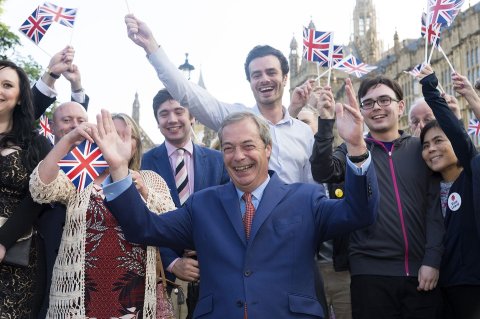
And at home?
Domestic policy has been very difficult. There have been some big wins, some big judicial appointments, tax reform…. The negatives have been getting tied down with a media that hate him. He's been bogged down a bit with [special counsel Robert] Mueller and this endless Russia stuff, and that has been very, very difficult.
Did you see Trump when you were last in Washington?
Yes.... No, the time before. At CPAC [the Conservative Political Action Conference]. I met him, and we sat down, and we had a chat about things. He was in top form. I think that he has got used to being president. He likes it. He wants to run again.
Let's talk about Syria. Trump and Macron may now take a more robust policy to that conflict. What do you think of that?
I am worried about it. Look, ISIS [the Islamic State militant group] have used chemical weapons a reported 52 times. The door is now open for ISIS to fire a couple of shells with chlorine gas in them, and goodness knows where we are going to be.
So do you think they were responsible for the attacks in Ghouta?
I didn't say that. The American administration have said locked and loaded. France and the U.K. are ready to go again. And I am slightly concerned.
But when you have a leader using chemical weapons against his own people, it is difficult to justify not doing anything, right?
It was a red line, wasn't it, put down by [President Barack] Obama, and a red line that didn't get followed up. Yeah, chemical weapons are horrible, but heavy, high-explosive artillery shells are pretty horrible too.
Has Russian intervention been a positive force in Syria?
I do take the view that extreme Islamic fundamentalism in the shape of ISIS is the great threat we face in the decades to come, and to see them being militarily beaten, in the way that they are, wouldn't have happened without the Russians.

What do you think of President Vladimir Putin?
I think he is a very questionable human being. I would not take him home on a Sunday afternoon to meet my mum for a cup of tea. But I think Russia is a strange country. Our understanding of it is very limited. We underestimate how much more frightened of us they are.
We would have done better to recognize that there are some big issues on which we have a shared interest with Russia. Instead, our foreign policy approach to Russia has been very confrontational.
How do you assess Mueller's investigation into Russia collusion?
I think it is going nowhere. I mean, how long has it been going on for now? There are quite a lot of people in D.C. who just cannot accept the result that happened on November 8, 2016, and are hanging on and praying that something will come out of the sky and bring the president down. I don't think it is going to happen.
Have you been contacted by anyone on Mueller's team?
No, why?
Well, about your links with the Trump campaign?
No.
There have also been allegations that Russia interfered in the Brexit campaign.
Just, just laughable.
Since you stood down as leader of UKIP in 2016, you've not had an official role in British politics. Any plans for a comeback?
I mean, look, if they drop the ball on Brexit, then I would have no hesitation in throwing myself back into full-time campaigning right across the length and breadth of the United Kingdom. I would love doing it again, being out on the road. But I'd rather not have to. I'd rather think we fought that, and we'd won, and it is now time to move on.
If you meet Trump when he visits in July, what will you say to him?
I would say welcome. We are very pleased to see you here. It is nice, for a change, to have an American president who actually likes our country.



